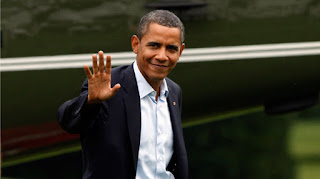Media Panel discussion from
GritTV.org and Laura Flanders from Friday September 18, 2009.
My highlights...
Janeane Garafalo: the teabagger protests are about racism..."...if they were upset about government takeovers, dishonesty, the unitary executive theory...if that bothered them, they would have been out every weekend since George Bush stole the first election in 2000."
Kai Wright: its self evident that people who talk about the President as Hitler and find it necessary to carry guns to town hall meetings are upset about something more than Health Policy. It should be reported as self-evident.
Kai Wright: There are legitimate anxieties within working class people about the state of their world today. Since there's no one out there speaking to them in a positive way about those anxieties, they're left with the crazy talk.
Janeane Garafalo: "their crazies are in the mainstream."
Laura Flanders: a pattern of conversation has developed certainly since Jeremiah Wright, to Sonia Sotomayor, to now Jimmy Carter's recent remarks that " ...to talk about racism, to mention it, to say there's a different experience of life in this country depending on what race you are, is to be racist."
Kai Wright: "The right's response to the civil rights movement has been to redefine racism." If the N word is not being used to describe an African American, then its not racism. "If I don't say something explicitly racist, then its not racism."
Kai Wright: Because the right has flummoxed the left by suggesting that even talking about race makes you a racist, there is another vacuum, and its being filled by the crazies.
Max Blumenthal: Its not enough for liberals to talk about race, but they need to advocate for policies that will help with racial issues. Example: Senator Jim Webb in Virginia has used his credibility among southern whites and his populism to push through some pretty progressive prison reform and drug policies. We should be paying attention to that angle.
QUESTION TO BE PONDERED: How do we speak to a person's anxiety so they feel 'heard' without caving in to their anxiety and becoming mired in their muck?
QUESTION TO BE PONDERED: How do we shift the conversation so it happens on our terms, not the right's?
We must be mindful that a person's individual context helps them define a word uniquely for their experience, and its important to recognize and verbalize any seemingly vague words when beginning a conversation, such as one about race.
In the last 20 years, we've allowed ourselves to be manipulated by the right wing's definition of terms. The mainstream media have gone along.
How do we engage in conversations with the media and with the right and make sure the conversation is based on a firm foundation of mutual agreement on terminology?
I've seen plenty of anchors ask really inane questions, and instead of calling them out on the question, the person just tries to answer. I would like to see them say "Your question presumes I agree with your characterization of the problem, I don't." I would think the interviewer would have to give the person a chance to define their point of view.
Although its a risky maneuver (news programs might not ask you back), I think if everybody who thinks like I do started responding to questions that way, it could have an impact.
Later today: And here's an example on how to answer the questions from Leonard Pitts from the Miami Herald in his Q and A...
Submitted by M Cardenas from Pembroke Pines FL
Q: Are you ever going to write an honest column about Reverend Wright, Vance Jones and Mark LLoyd and their relationship with the President? Do you consider yourself a 'post racial' columnist as President Obama feels he is a 'post racial' Politician?
Answered 09/16/09 13:20:53 by Leonard Pitts
A: I love when people ask questions front loaded with their own biases. You've shared yours, now let me share mine: Will I ever write a column slanted and alarmist enough to please the unhinged conspiracy theorists of the political right who slander conservatives by calling themselves conservative? God, I hope not. And I'm not a "post-racial" anything. Nor, for that matter, is President Obama, as today's column should demonstrate amply.

































